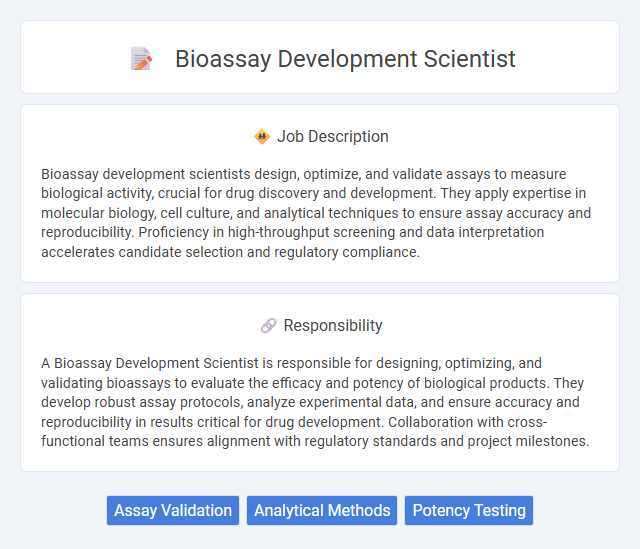
Bioassay development scientists design, optimize, and validate assays to measure biological activity, crucial for drug discovery and development. They apply expertise in molecular biology, cell culture, and analytical techniques to ensure assay accuracy and reproducibility. Proficiency in high-throughput screening and data interpretation accelerates candidate selection and regulatory compliance.
Individuals with strong analytical skills and a background in biochemistry or molecular biology are likely well-suited for a Bioassay Development Scientist role. Those who enjoy working in a lab environment, are detail-oriented, and have patience for iterative experimentation may find this job fulfilling. People who prefer routine tasks or lack interest in scientific research might find this position less suitable.
Qualification
A Bioassay Development Scientist typically holds a master's or doctoral degree in biochemistry, molecular biology, pharmacology, or a related life science field. Expertise in cell-based and biochemical assay development, validation, and high-throughput screening techniques is essential. Strong analytical skills, proficiency in data analysis software, and experience with regulatory compliance standards such as GLP or FDA guidelines are often required.
Responsibility
A Bioassay Development Scientist is responsible for designing, optimizing, and validating bioassays to evaluate the efficacy and potency of biological products. They develop robust assay protocols, analyze experimental data, and ensure accuracy and reproducibility in results critical for drug development. Collaboration with cross-functional teams ensures alignment with regulatory standards and project milestones.
Benefit
Bioassay development scientist roles likely offer significant benefits including opportunities for hands-on experience with cutting-edge laboratory techniques and technologies. Employees may experience professional growth through collaboration with cross-functional teams in pharmaceutical or biotech settings. There is a strong probability of accessing competitive compensation packages and comprehensive health benefits.
Challenge
Bioassay development scientists likely face challenges related to designing accurate and reproducible assays that can measure biological activity with high sensitivity and specificity. The complexity of biological systems and variability in reagents may pose difficulties in establishing robust protocols. Continuous optimization and troubleshooting might be required to address issues such as assay interference or low signal-to-noise ratios.
Career Advancement
Bioassay development scientists play a critical role in pharmaceutical and biotechnology industries by designing and optimizing assays to evaluate biological activity of compounds. Mastery in advanced techniques such as high-throughput screening and cell-based assays enhances opportunities for leadership positions and specialized roles in research and development. Continuous skill advancement in data analysis, regulatory compliance, and innovative assay platforms supports career progression toward senior scientist or project management roles.
Key Terms
Assay Validation
Bioassay development scientists specialize in designing, optimizing, and validating bioassays to ensure precise and reliable measurement of biological activity in drug candidates. Assay validation involves rigorous testing of parameters such as specificity, sensitivity, accuracy, precision, and reproducibility to meet regulatory standards like FDA and ICH guidelines. Expertise in statistical analysis, laboratory techniques, and documentation is essential for producing validated assays that support drug discovery and clinical development.
Analytical Methods
A Bioassay Development Scientist specializes in designing and optimizing analytical methods to evaluate biological activity and potency of pharmaceutical compounds. Expertise in cell-based assays, ELISA, and high-throughput screening techniques ensures precise measurement of drug efficacy and safety. Proficiency in regulatory guidelines and validation protocols enhances the reliability and reproducibility of bioanalytical data.
Potency Testing
Bioassay development scientists specializing in potency testing design and validate bioassays that measure the biological activity of drug candidates and therapeutic products. They optimize assay conditions to ensure reproducibility, accuracy, and sensitivity for regulatory submissions and quality control. Expertise in cell-based and biochemical assays, along with strong analytical skills, enables precise quantification of drug potency to support product development and release.
 kuljobs.com
kuljobs.com